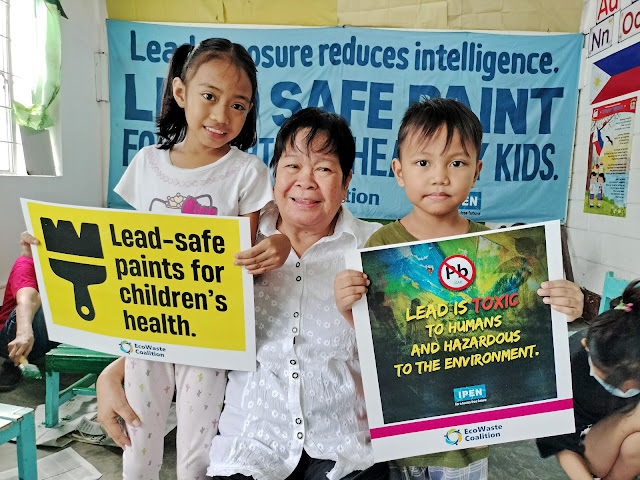EcoWaste Coalition Says: Protect Children's Health, Uphold Lead Paint Ban
EcoWaste Coalition will join the Global Alliance to Eliminate Lead Paint (referred herein as the Alliance), a joint program of WHO and UNEP, for International Lead Poisoning Prevention Week (ILPPW) this October 23-29, emphasizing the urgent need to protect children’s health through action to eliminate the use of lead paint.
During the week of action, the EcoWaste Coalition will draw attention to lead-based paint hazards, repaint children’s chairs and tables with lead-safe Boysen, Davies and Sycwin paints, and release a new report on lead-containing spray paints sourced from abroad and sold locally, including in online shopping sites.
EcoWaste Coalition is a member of IPEN, a global coalition of over 600 public interest organizations in over 125 countries working to eliminate toxic substances and places. IPEN is a founding member of the Alliance and a member of its Advisory Board. This year’s ILPPW events will mark the tenth anniversary of the annual week-long effort to raise the global profile of ongoing lead poisoning threats, including from lead paint, which continues to be produced and used in the majority of countries around the world.
Since 2009, IPEN member groups have conducted more than 100 studies on more than 4,000 paints from 59 countries, including in the Philippines. Studies published by the EcoWaste Coalition and IPEN after the completion of the phase-out period for lead-containing paints in December 2019 show that such paints are still offered for sale in the country.
“While most domestic paint makers have successfully transitioned to non-lead manufacturing of paints for all uses, we still find lead-containing paints, such as imported spray paints, in store shelves and in online shopping platforms,” said Aileen Lucero, National Coordinator, EcoWaste Coalition. “There is obviously a need to uphold the national ban on lead paints through new global and local initiatives."
Decades of evidence has shown that there is no safe level of exposure to lead. Lead is a potent poison that affects multiple body systems and is particularly harmful to young children. Even at low doses, lead can affect children’s brain development, resulting in reduced IQ, behavioral changes such as reduced attention span and increased antisocial behavior, and reduced educational attainment. Lead exposure can also damage the kidneys, reproductive organs, and the immune system and result in anemia and hypertension. The neurological and behavioral effects of lead are typically irreversible.
To end the use of lead paint in the Philippines, the EcoWaste Coalition is calling for heightened compliance monitoring to ensure that the DENR-issued Chemical Control Order (CCO) for Lead and Lead Compounds (DAO NO. 2013-24) banning lead in paint production is effectively enforced.
In addition, together with IPEN, EcoWaste Coalition is calling for listing of lead chromates under the Rotterdam Convention. Even countries with legally binding national bans have difficulty in enforcement when lead chromates, the lead-containing pigments used in paint, continue to be traded globally without prior knowledge or consent. Listing lead chromates would trigger the Convention’s Prior Informed Consent (PIC) procedure and give countries the information they need to reject imports of lead chromates and lead paints.
“We have long known about the toxic threats from lead paint to our children and families, and many countries ended lead paint sales decades ago. Yet in most of the world, lead paint is still used and poses lifelong health threats to millions of children,” said Manny Calonzo, 2018 Goldman Prize Winner, former co-chair of IPEN, and founding developer of IPEN’s Lead Safe Paint® certification program. “Our kids can’t wait another ten years to eliminate lead paint - we need urgent action to stop this poisoning of our children.”
Even in countries where lead paint has been banned, older housing with lead paint continues to result in lead-related health problems for millions of children. That is why action to eliminate lead paint globally is urgent – lead paints sold today will continue to pose health threats to children for decades.









Comments